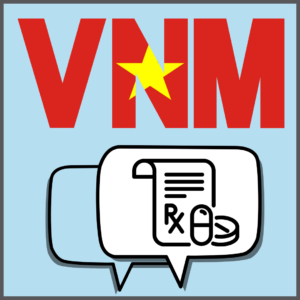
The Vietnamese pharmaceutical market has recently experienced strong growth. According to current forecasts, the market is expected to reach a turnover of around USD 2.4 billion in 2024. Furthermore, an average annual growth rate of 4.25 % is expected until 2029. Growth will be boosted by factors such as an ageing population, rising healthcare expenditure and the spread of chronic diseases. The Vietnamese government has also taken measures to promote domestic production and improve the regulatory framework, making the market more attractive to both domestic and foreign investors. In addition, pharmaceutical serialization was introduced in Vietnam in 2024.
Title: Circular 23/2023/TT-BYT
Competent authority: Drug Administration of Vietnam (DAV) under the Ministry of Health
Products: Prescription and OTC drugs
Code type: GS1-128, DataMatrix, QR or RFID
Timeframe: Mandatory labelling since 1 June 2018, serialization since 15 January 2024
Labelling regulations
Mandatory labeling was introduced in Vietnam in 2018. The corresponding Circular 01/2018/TT-BYT from the Vietnamese Ministry of Health contains guidelines on the labeling and package inserts of medicinal products. According to this, the following information must be included at the secondary level:
- Name of the drug;
- Dosage form;
- Composition of the medicinal products, content, weight or concentration of the active substances or herbal ingredients;
- Contents of the packaging;
- Indications, instructions for use and contraindications;
- Registration number or import license number (if available);
- Batch number, date of manufacture, expiry date, quality standards and storage conditions;
- Precautions and recommendations;
- Name and address of the manufacturer;
- Name and address of the importer (for imported medicinal products);
- Origin of the medicinal product
If products do not have secondary packaging, this information must be printed on the primary packaging.
Serialization and traceability
Plans to introduce serialization in Vietnam came some time after the labeling requirement. However, in 2024, regulations were introduced to ensure the traceability of pharmaceutical products. Thereby, each product is assigned a unique identifier. With the help of this, the path of the product can be traced from production to the end consumer. Relevant regulations were laid down in Circular 23/2023/TT-BYT. Under this circular, which came into force on 15 January 2024, the serialization of pharmaceutical products is mandatory. It requires manufacturers to affix a unique serial number to the packaging. These are recorded and reported to the Vietnamese drug authority for monitoring and verification. The GS1-compliant data carriers GS1-128, DataMatrix, QR or RFID are to be used for the machine-readable code.
Incentives for international pharma companies
Another innovation in the same year are the incentives created for foreign investors. Its aim is to strengthen the rights and responsibilities of companies from abroad. Previously existing hurdles that made expansion into the Vietnamese market unattractive are to be removed. Specifically, the following incentives are mentioned:
- Tax relief on investments;
- Incentives to take out loans;
- Advantages for leasing land;
- Support with administrative procedures in connection with investments and business;
- Issuance of certificates for pharmaceutical business qualifications;
- Issuance of licenses for the distribution of pharmaceuticals;
- Support for scientific research in the field of pharmaceutical formulation technology and biotechnology for the production of new drugs; and
- other investment promotion policies prescribed by law.
Rights and obligations of foreign pharma companies
With the creation of new incentives for investment, the rights and obligations for foreign pharmaceutical companies have also been adjusted. The additional rights in particular are also intended to serve as an incentive. They are similar to those for domestic companies. Unlike before, foreign companies are now permitted to carry out business activities in the pharmaceutical sector without restrictions. Additionally. they are permitted to advertise medicines under the new regulations. Importing APIs and medicines for production and clinical trials has also been simplified.
Before the changes in 2024, investors from abroad faced considerable obstacles. These included the restriction on importing medicines and active ingredients but not being allowed to distribute them, which was reserved for domestic companies. This restriction often forced foreign companies to enter into partnerships with local companies. Another restriction for foreign pharmaceutical companies concerned the trade in medicines. They were not allowed to distribute medicines or APIs that were not manufactured by the company itself. The new regulations aim to overcome trade barriers, but at the same time should not put local companies at a disadvantage. As part of this, Vietnam is granting foreign pharmaceutical companies increased investment opportunities, import rights and political incentives.
You can also take a look at our other articles dedicated to national regulations:
[Disclaimer] This information is only one possible interpretation of the regulations. They are also in a constant state of change, so the information in this article may be incomplete or out of date. The above article is expressly no legal advice. Please refer to the official documents for information before making any business decisions. (Status of information: September 2024)